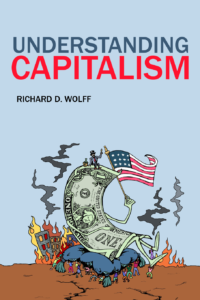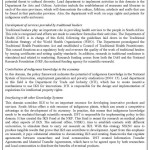How To Tackle The Climate Crisis And Inequality

James K. Boyce – Photo by Matthew Cavanaugh
08-12-2024 ~ Carbon dividends, public investment, and binding carbon-emissions reductions to commensurate reductions of toxic air pollutants from fossil fuels are three policies that narrow inequality rather than widening it.
Our planet is warming up at a record rate. Scientists believe that the climate is warming up as a consequence of the increase in greenhouse gases. Studies have also shown that there is a link between climate change and inequality. Yet, the global economy continues to be overly dependent on fossil fuels—oil, natural gas, and coal—which are by far the largest contributor to global warming. What does all this say about current climate policies and the goal of achieving carbon neutrality by 2050? And how do we address the twin challenges of inequality and climate change?
In the interview that follows, progressive political economist James K. Boyce sheds light on the above questions. James K. Boyce is a senior fellow at the Political Economy Research Institute at the University of Massachusetts Amherst, and recipient of the inaugural Global Inequality Research Award. He is the author, among many other works, of The Case for Carbon Dividends and Economics for People and the Planet: Inequality in the Era of Climate Change.
C. J. Polychroniou: Over the past several years, climate records have been repeatedly broken. Last year was the planet’s hottest by a huge margin since global records began in 1850, and 2024 is on course to break that record again. Are climate policies designed to reduce greenhouse gas emissions working, especially when we have wars going on that contribute significantly to climate change? Indeed, with everything going on, which includes increased demand for oil, is it at this point even realistic to expect that we can achieve climate neutrality by 2050?
James K. Boyce: You’re right, it’s getting hotter year by year. This is no surprise: it’s exactly what we can expect until the world reaches climate neutrality (net-zero emissions of greenhouse gases). Some climate policies are working better than others—it is not as if nothing is happening. Renewable energy from solar and wind has become cost-competitive more quickly than most people expected. But we are not on track to achieve climate neutrality by 2050. To do so we would need to phase out the use of oil, natural gas, and coal. Instead, global consumption of all three fossil fuels is at an all-time high.
You are right, too, that wars exacerbate the problem. They distract attention and resources from addressing the climate crisis, and they add to greenhouse gas emissions. In just the first two months of the war in Gaza, for example, carbon emissions (mostly from Israeli warplanes and U.S. weaponry supply flights) exceeded the annual emissions of 20 countries, according to a team of U.K. researchers. Postwar reconstruction, once this latest round of bloodshed ends, is likely to release much more. Read more
The Undemocratic Reality Of Capitalism

ISBN Paperback: 978-1-7356013-6-6, eBook: 978-1-7356013-5-9
08-10-2024 ~ Fans of capitalism like to say it is democratic or that it supports democracy. Some have stretched language so far as to literally equate capitalism with democracy, using the terms interchangeably. No matter how many times that is repeated, it is simply not true and never was. Indeed, it is much more accurate to say that capitalism and democracy are opposites. To see why, you have only to look at capitalism as a production system where employees enter into a relationship with employers, where a few people are the boss, and most people simply work doing what they are told to do. That relationship is not democratic; it is autocratic.
When you cross the threshold into a workplace (e.g., a factory, an office, or a store), you leave whatever democracy might exist outside. You enter a workplace from which democracy is excluded. Are the majority—the employees—making the decisions that affect their lives? The answer is an unambiguous no. Whoever runs the enterprise in a capitalist system (owner[s] or a board of directors) makes all the key decisions: what the enterprise produces, what technology it uses, where production takes place, and what to do with enterprise profits. The employees are excluded from making those decisions but must live with the consequences, which affect them deeply. The employees must either accept the effects of their employers’ decisions or quit their jobs to work somewhere else (most likely organized in the same undemocratic way).
The employer is an autocrat within a capitalist enterprise, like a king in a monarchy. Over the past few centuries, monarchies were largely “overthrown” and replaced by representative, electoral “democracies.” But kings remained. They merely changed their location and their titles. They moved from political positions in government to economic positions inside capitalist enterprises. Instead of kings, they are called bosses or owners or CEOs. There they sit, atop the capitalist enterprise, exercising many king-like powers, unaccountable to those over whom they reign.
Democracy has been kept out of capitalist enterprise for centuries. Many other institutions in societies where capitalist enterprises prevail—government agencies, universities and colleges, religions, and charities—are equally autocratic. Their internal relationships often copy or mirror the employer/employee relationship inside capitalist enterprises. Those institutions try thereby to “function in a businesslike manner.” Read more
The Role Of Ancient DNA In Modern Traits
 08-07-2024 ~ Ancient human retrovirus DNA could be one of the markers of susceptibility to mental illness—specifically schizophrenia, bipolar disorder, and major depressive disorder, a new study suggests.
08-07-2024 ~ Ancient human retrovirus DNA could be one of the markers of susceptibility to mental illness—specifically schizophrenia, bipolar disorder, and major depressive disorder, a new study suggests.
Ancient human retrovirus DNA could be one of the markers of susceptibility to mental illness—specifically schizophrenia, bipolar disorder, and major depressive disorder, a new study suggests.
An international team of researchers examined 732 post-mortem brain samples and identified variations in DNA associated with different psychiatric conditions, which they cross-referenced with data from large genetic studies. The research appears in Nature Communications, May 22, 2024.
In a summary of their work for a nonspecialist audience, three of the study authors report that their research is the first to show that ancient viral DNA is one of the avenues through which genetic susceptibility to psychiatric disorders may occur. They are careful not to attribute causality here, but to note that their findings “suggest” a link that deserves further exploration.
Human Endogenous Retroviruses
The ancient viral DNA is called human endogenous retroviruses, or HERVs, and makes up about 8 percent of the human genome. HERVs are DNA sequences that originated as viral infections millions of years ago and evolved in mammals through genetic mutations and deletions over time. Retroviruses are those that infect cells by inserting a copy of their own genes into the cell DNA.
First identified in the 1980s, HERVs have been characterized as “viral fossils”that continue to be passed on to modern generations. At first, HERVs were considered to be “junk DNA,” with no known functions. As genomic technology advanced, scientists identified some specific roles for HERVs, such as producing RNA (ribonucleic acid) molecules that lead to proteins, and possibly regulating neighboring genes.
Most HERVs are thought to be inert, but some are known to play an active role in human physiology. For example, two known beneficial HERVs are those involved in the formation of the placenta and in embryogenesis, helping to make pregnancy possible. Other HERVs have been detected in some types of cancer, and research is beginning to look at how to target and possibly control these HERVs to treat the cancer. Read more
Forget Wealth Tax. We Should Abolish Extreme Wealth Altogether

C.J. Polychroniou
08-02-2024 ~ Wealth taxation may sound like a good idea, but can it really address, let alone solve, the problem of inequality?
Economic inequality is the scourge of the 21st century. The rich are getting richer and faster than any other time since the onset of neoliberalism, which calls for “free-market” capitalism, regressive taxation, fiscal austerity and the rejection of the social state. They get richer not only when the economy is on an upswing but even amid crises. Billionaires more than doubled their net worth during the pandemic, according to Bloomberg Billionaires Index.
The latest analysis shows that the richest 1 percent gained $42 trillion in new wealth over the past decade, which amounts to “nearly 34 times more than the entire bottom 50 percent of the world’s population.” In the meantime, the very poor and low-income people across the globe, including the U.S., are actually getting poorer. So much for trickle-down economics which was popularized during the 1980s by the Reagan administration’s vast capital gains and income tax cuts and continues to persist to this day in spite of its major flaws. Cutting taxes on the rich not only increases economic inequality but has no effect on economic growth and unemployment.
Economic inequality is the scourge of the 21st century. The rich are getting richer and faster than any other time since the onset of neoliberalism, which calls for “free-market” capitalism, regressive taxation, fiscal austerity and the rejection of the social state. They get richer not only when the economy is on an upswing but even amid crises. Billionaires more than doubled their net worth during the pandemic, according to Bloomberg Billionaires Index.
The latest analysis shows that the richest 1 percent gained $42 trillion in new wealth over the past decade, which amounts to “nearly 34 times more than the entire bottom 50 percent of the world’s population.” In the meantime, the very poor and low-income people across the globe, including the U.S., are actually getting poorer. So much for trickle-down economics which was popularized during the 1980s by the Reagan administration’s vast capital gains and income tax cuts and continues to persist to this day in spite of its major flaws. Cutting taxes on the richnot only increases economic inequality but has no effect on economic growth and unemployment. Read more
- Page 3 of 3
- previous page
- 1
- 2
- 3


